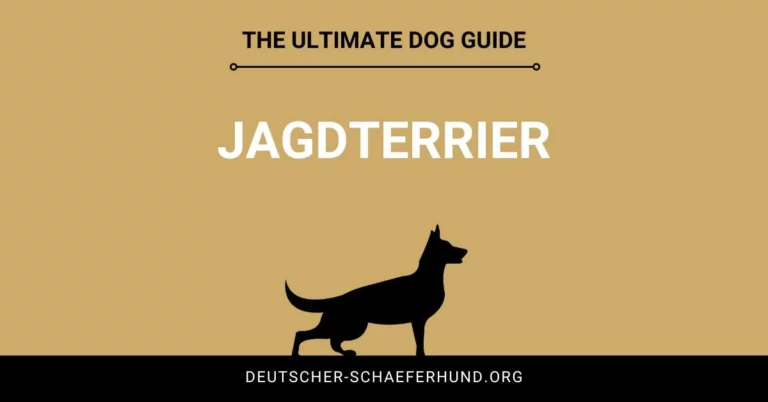Introduction
The Jagdterrier, also known as the German Hunt Terrier, is a versatile hunting breed that hails from Germany. These compact yet robust dogs are known for their intelligence, courage, and relentless drive when it comes to work. The Jagdterrier was developed in the 1920s by a group of German hunters who wanted a dedicated, disciplined hunting dog that was fearless and hardy. The breed we know today emerged as a capable hunter of foxes, weasels, and other small game, demonstrating an impressive level of tenacity and agility.
| Feature | Detail |
|---|---|
| Breed Name | Jagdterrier (German Hunt Terrier) |
| Origin | Germany |
| Size | Small to Medium |
| Weight | 17-22 pounds |
| Height | 13-16 inches |
| Coat Type | Dense, harsh, can be smooth or rough |
| Coat Colors | Black and tan to dark brown |
| Life Span | 13-15 years |
| Personality Traits | Energetic, intelligent, loyal, fearless |
| Common Uses | Hunting, companion |
| Health Issues | Hip dysplasia, eye disorders, skin conditions |
Jagdterrier Breed Characteristics
Appearance
With their strong, compact bodies, Jagdterriers boast a rugged yet sleek appearance. They have a distinctive rectangular shape, accentuated by a sturdy, slightly curved back and a robust, deep chest.
Size and Weight
A Jagdterrier typically weighs between 17 and 22 pounds and stands about 13 to 16 inches tall at the shoulder. This makes them a perfectly sized companion for any hunting expedition.
Coat and Colors
Jagdterriers have a dense, harsh double coat that can either be smooth or rough. Their coat colors range from black and tan to dark brown, often with small white markings on the chest and toes.
Personality and Temperament of a Jagdterrier
General Behavior
Jagdterriers are energetic and tireless, with a keen sense of determination. They are alert and spirited dogs, often showing a lot of curiosity and eagerness to explore their surroundings.
Interaction with Humans
These dogs form strong bonds with their human families, displaying loyalty and affection. They can be wary of strangers but are never aggressive without reason. Proper socialization is crucial to ensuring a well-rounded Jagdterrier.
Interaction with Other Animals
Given their hunting origins, Jagdterriers might display strong prey drives toward smaller animals. They can get along with other dogs if properly socialized from an early age.
Training and Socialization for Your Jagdterrier
Training Methods Suited for Jagdterriers
Jagdterriers are intelligent and quick learners. They respond best to positive reinforcement methods, including rewards like treats and praise. Consistency and patience are key when training this breed.
Importance of Socialization
Exposing your Jagdterrier to different environments, people, and animals from a young age is critical. This can help them become well-adjusted and reduce tendencies towards over-protectiveness or aggressiveness.
Behavioral Issues and Remedies
Potential behavioral issues include excessive barking, digging, or stubbornness. Regular exercise, mental stimulation, and consistent training can help alleviate these behaviors.
Health and Lifespan of a Jagdterrier
General Health Information
The Jagdterrier is generally a healthy breed with few inherited health issues. Regular veterinary check-ups and a balanced diet can ensure a long and healthy life.
Common Health Problems
Some health issues that may affect the Jagdterrier include hip dysplasia, eye disorders, and skin conditions. It’s crucial to ensure your dog is from a reputable breeder who conducts necessary health screenings.
Lifespan and Aging
Jagdterriers are known for their longevity, often living up to 13-15 years. As they age, they may slow down a bit, but generally maintain their energetic and lively nature.
Diet and Nutrition for Your Jagdterrier
Dietary Requirements
A high-quality dog food suited for your Jagdterrier’s age, size, and activity level is necessary. Foods high in protein can support their high-energy needs.
Common Food Allergies and Sensitivities
Some Jagdterriers may have food sensitivities or allergies, manifesting in skin issues or digestive problems. It’s important to identify these early and adjust their diet accordingly.
Recommended Feeding Schedule and Portions
Feeding your Jagdterrier twice a day can prevent bloating. The exact portion size depends on your dog’s weight, age, and activity level. Always consult with a vet for specific recommendations.
Grooming and Care for Your Jagdterrier
Coat Care and Grooming
Despite their dense coat, Jagdterriers are relatively low-maintenance when it comes to grooming. Regular brushing can help remove loose hairs and keep the coat healthy.
Dental, Ear, and Eye Care
Regular teeth brushing, ear cleaning, and eye checks are essential. This can prevent common issues like dental disease, ear infections, and eye disorders.
Exercise and Activity Levels
Jagdterriers are active dogs that require daily exercise. Regular walks, play sessions, and mental stimulation through games and training can keep them content and healthy.
Breeding and Puppies
Breeding Information
Breeding Jagdterriers should be left to experienced breeders who understand the breed’s specific needs and can ensure the health and well-being of both the parents and puppies.
Raising Jagdterrier Puppies
Raising a Jagdterrier puppy requires time, patience, and consistency. Early socialization, training, and a structured routine can lead to a well-adjusted adult dog.
Things to Know When Buying a Jagdterrier Puppy
Always choose a reputable breeder who provides health clearances for the puppies. Be prepared for a lively, energetic puppy that requires early training and socialization.
Working and Hunting Capabilities of a Jagdterrier
Hunting Skills and Training
As a breed created for hunting, Jagdterriers has excellent tracking and chasing skills. Training them for hunting requires building on these natural instincts while ensuring obedience and control.
Other Work Roles
Aside from hunting, Jagdterriers can excel in other work roles such as search and rescue, owing to their keen sense of smell, high energy levels, and determination.
Living Conditions Suitable for a Jagdterrier
Best Living Environments
Jagdterriers are adaptable and can thrive in various living conditions. However, given their active nature and hunting instincts, they’re better suited to homes with secure, fenced yards where they can run and explore safely. They can adapt to apartment living too, provided they get sufficient daily exercise and mental stimulation.
Climate Tolerance
Thanks to their dense double coat, Jagdterriers can tolerate a wide range of climates. They fare well in cooler weather but can also handle warmer temperatures with access to shade and plenty of water. However, extreme heat should be avoided as it can lead to overheating.
Fun Facts About Jagdterriers
Unique Qualities
Did you know that the name ‘Jagdterrier’ translates to ‘hunt terrier’ in German? True to their name, these dogs are fearless hunters. Their small size was purposely bred to allow them to follow prey into burrows.
Celebrity Jagdterrier Owners
While not a commonly seen breed among celebrities, those who value an active lifestyle and outdoor pursuits will find a loyal companion in the Jagdterrier. So, who knows? The next celebrity dog sighting might just be a Jagdterrier!
Conclusion
The Jagdterrier is a robust, energetic, and intelligent breed, created for hunting but equally capable as a family companion with the right training and socialization. They require an active lifestyle and consistent mental stimulation. Owning a Jagdterrier can be a rewarding experience, especially for active individuals or families who can meet their high-energy needs. Remember, the key to a happy, well-adjusted Jagdterrier is consistent training, early socialization, and plenty of love and care.



